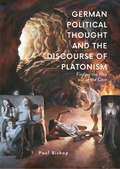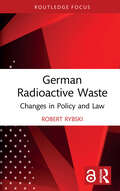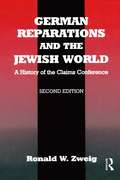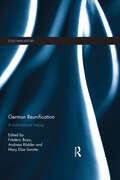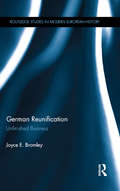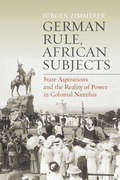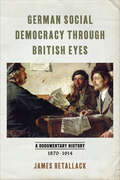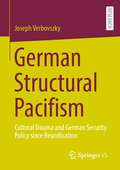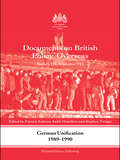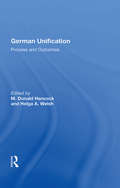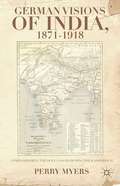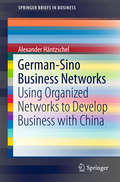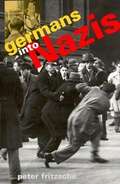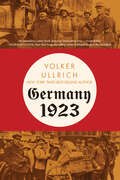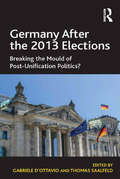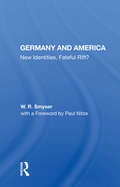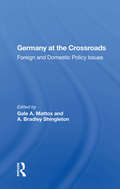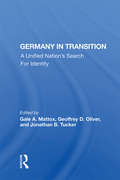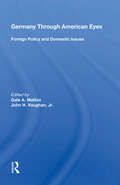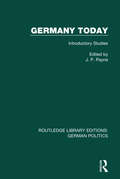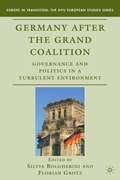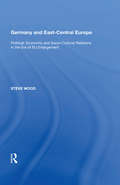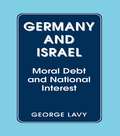- Table View
- List View
German Political Thought and the Discourse of Platonism: Finding the Way Out of the Cave
by Paul BishopTaking Plato’s allegory of the cave as its starting-point, this book demonstrates how later European thinkers can be read as a reaction and a response to key aspects of this allegory and its discourse of enchainment and liberation. Focusing on key thinkers in the tradition of European (and specifically German) political thought including Kant, Marx, Hegel, Nietzsche, Heidegger, and the Frankfurt School, it relates them back to such foundational figures as Rousseau, Aristotle, and in particular Plato. All these thinkers are considered in relation to key passages from their major works, accompanied by an explanatory commentary which seeks to follow a conceptual and imagistic thread through the labyrinth of these complex, yet fascinating, texts. This book will appeal in particular to scholars of political theory, philosophy, and German language and culture.
German Radioactive Waste: Changes in Policy and Law (Routledge Focus on Environment and Sustainability)
by Robert RybskiThis book presents the universal issue of radioactive waste management from the perspective of the German legal system, analysing how lawmakers have responded to the problem of nuclear waste over the course of the last seventy years. In this book, Robert Rybski unwraps and explains the perplexing legal and social issues related to radioactive waste. He takes readers through the entire ‘life-cycle’: from the moment that radioactive material is classified as radioactive waste, through to the period of interim storage, and right up to its final disposal. However, this last step in radioactive waste management (that of final disposal) has not yet been achieved in Germany, or anywhere in the world, and has been the subject of hefty public debate for dozens of years. As a result, the book analyses the most recent regulations in place to enable final disposal. This book will be of interest to energy policy experts, academics and professionals who work in the area of nuclear energy.
German Reparations and the Jewish World: A History of the Claims Conference
by Ronald W. ZweigGerman Reparations and the Jewish World" has become a standard reference work since it was first published. Based extensively on archival sources, the author examines the difficult debate within the Jewish world whether it was possible to reach a material settlement with Germany so soon after Auschwitz. Concentrating on how the money was spent in rebuilding Jewish life, he also analyzes how the reparations payments transformed the relations bteween Israel and the diaspora, and between different Jewish political and ideological groups. This revised and expanded edition includes material on sensitive relief programmes from archives that have only recently been opened to researchers. In a new, extensive introductory essay the author reexamines the reparations, restitution and indemnification processes from the perspective of 50 years later.
German Reunification: A Multinational History (Cold War History)
by Mary Elise Sarotte Frédéric Bozo Andreas RödderThis book provides a multinational history of German reunification based on empirical work by leading scholars. The reunification of Germany in 1989-90 was one of the most unexpected and momentous events of the twentieth century. Embedded within the wider process of the end of the Cold War, it contributed decisively to the dramatic changes that followed: the end of the division of Europe, the collapse of the Warsaw Pact, the origins of NATO’s eastward expansion and, not least, the creation of the European Union. Based on the wealth of evidence that has become available from many countries involved, and relying on the most recent historiography, this collection takes into account the complex interaction of multinational processes that were instrumental in shaping German reunification in the pivotal years 1989-90. The volume brings together renowned international scholars whose recent works, based on their research in multiple languages and sources, have contributed significantly to the history of the end of the Cold War and of German reunification. The resulting volume represents an important contribution to our knowledge and understanding of a significant chapter in recent history. This book will be of much interest to students of German politics, Cold war history, international and multinational history and IR in general.
German Reunification: Unfinished Business (Routledge Studies in Modern European History)
by Joyce E. BromleyIn 1945, German families with more than 100 hectares (247 acres) of land were forced from their homes in the eastern sector by the Soviets, now in control of that area. These families were brutally evicted from their property and had their land expropriated. In the next 45 years, the GDR government would come to control all of the agricultural land. At reunification in 1990, the earlier abuse of these farmers was compounded when the German government would not restore any of this expropriated land to these families. The German government falsely accused the Soviet Union of insisting on non-restitution as a condition of reunification. Soviet leader Mikhail Gorbachev unequivocally denies this claim and insists that land issues are a German problem to resolve. The temporary land-trust agency, established by the German government in 1990 to dispose of land it inherited from the GDR, continues to exist. After 25 years, this agency still holds almost 20 percent of this expropriated land. Its agents, most of whom were reared in GDR, decide who may (or may not) lease land, the conditions of the lease, and if and when a farmer may buy land – circumstances that remain deeply controversial. Joyce Bromley draws on extensive field research, and previously untapped sources, to explore the reliability of the government’s version of these important events. Is the German government once again, without shame, discriminating against a group of its own citizens?
German Rule, African Subjects: State Aspirations and the Reality of Power in Colonial Namibia
by Jürgen ZimmererAlthough it lasted only thirty years, German colonial rule dramatically transformed South West Africa. The colonial government not only committed the first genocide of the twentieth century against the Herero and Nama, but in their efforts to establish a “model colony” and “racial state,” they brought about even more destructive and long-lasting consequences. In this now-classic study—available here for the first time in English—the author provides an indispensable account of Germany's colonial utopia in what is present-day Namibia, showing how the highly rationalized planning of Wilhelmine authorities ultimately failed even as it added to the profound immiseration of the African population.
German Rule, African Subjects: State Aspirations and the Reality of Power in Colonial Namibia
by Jürgen ZimmererAlthough it lasted only thirty years, German colonial rule dramatically transformed South West Africa. The colonial government not only committed the first genocide of the twentieth century against the Herero and Nama, but in their efforts to establish a “model colony” and “racial state,” they brought about even more destructive and long-lasting consequences. In this now-classic study—available here for the first time in English—the author provides an indispensable account of Germany's colonial utopia in what is present-day Namibia, showing how the highly rationalized planning of Wilhelmine authorities ultimately failed even as it added to the profound immiseration of the African population.
German Social Democracy through British Eyes: A Documentary History, 1870–1914
by James RetallackOn the eve of the First World War, the German Social Democratic Party (SPD) was the largest and most powerful socialist party in the world. German Social Democracy through British Eyes examines the SPD’s rise using British diplomatic reports from Saxony, the third-largest federal state in Imperial Germany and the cradle of the socialist movement in that country. Rather than focusing on the Anglo-German antagonism leading to the First World War, the book peers into the everyday struggles of German workers to build a political movement and emancipate themselves from the worst features of a modern capitalist system: exploitation, poverty, and injustice. The archival documents, most of which have never been published before, raise the question of how people from one nation view people from another. The documents also illuminate political systems, election practices, and anti-democratic strategies at the local and regional levels, allowing readers to test hypotheses derived only from national-level studies. This collection of primary sources shows why, despite the inhospitable environment of German authoritarianism, Saxony and Germany were among the most important incubators of socialism.
German Structural Pacifism: Cultural Trauma and German Security Policy since Reunification
by Joseph VerbovszkyGerman Structural Pacifism examines the influence of Germany’s lessons of the past on its security policy since reunification in an approach that is both novel and timely in the context of the Russia-Ukraine War. Germany’s lessons of the past provide contradictory “right ways” for Germany to overcome its authoritarian past and serve to legitimate political interests in security policy decision-making. Reconciling competing political interests and contradictory narratives results in a security policy that prioritizes “the right way” to do security policy is over its effectiveness. It is the author’s great merit to have defined the past 30 years of German security policy under the term Structural Pacifism. I find this conclusive. Sönke Neitzel, Chair of Military History at the University of Potsdam An accurate depiction of Germany’s systemic neglect of its armed forces since reunification, demonstrating why it is no surprise that our armed forces are naked. A follow up including the Zeitenwende would be very interesting. Hans-Peter Barthels, President of the German Society for Security Policy The book succinctly and accurately addresses the lack of an honest debate on the use of military force in the domain of German security policy, and explores its negative impact on military decision-making from political strategy all the way down to the tactical level. Volker Wieker, Former Chief of Defense of the German Federal Armed Forces (2009-2018)
German Unification 1989-90: Documents on British Policy Overseas, Series III, Volume VII (Whitehall Histories)
by P. SalmonThis volume is comprised of a collection of diplomatic documents covering British reactions to, and policy towards, the collapse of the German Democratic Republic and the unification of Germany in 1989-90. The peaceful unification of Germany in 1989-90 brought a dramatic end to the Cold War. This volume documents official British reactions to the collapse of East Germany and the fall of the Berlin Wall, and the evolution of British policy during the ‘Two plus Four’ negotiations that provided the international framework for the merger of the two German states. All of the documents fall within the UK’s 30-year rule and have therefore not previously been in the public domain. Most are drawn from the archives of the Foreign and Commonwealth Office, but there are also a large number of Prime Ministerial files from the Cabinet Office archives. These are of particular interest for the light they throw on the views of Margaret Thatcher. Taken together, the documents show that despite Mrs Thatcher’s well-known reservations about German unity, the United Kingdom played a vital and constructive role in the negotiations that helped to bring it about. This volume will be of great interest to students of International History, British Political History, and European Politics and International Relations in general. Patrick Salmon is Chief Historian at the Foreign and Commonwealth Office. Keith Hamilton is a Historian at the Foreign and Commonwealth Office and Senior Editor of Documents on British Policy Overseas. Stephen Twigge is a Senior Historian at the Foreign and Commonwealth Office.
German Unification: Process And Outcomes
by M. Donald HancockThe East European revolutions of 1989 led to momentous changes throughout the region. Nowhere were they felt more dramatically than in Germany, where unification unexpectedly became reality, unfolding with breathtaking speed, unhindered by major obstacles. However, joy over the fall of the Berlin Wall and the opening of the borders was soon dampene
German Visions of India, 1871–1918
by Perry MyersThe wide-ranging fascination with India in Wilhelmine Germany emerged during a time of extraordinary cultural and political tensions. This study shows how religious (denominational and spiritual) dilemmas, political agendas, and shifting social consensus became inextricably entangled in the wider German encounter with India during the Kaiserreich.
German, Jew, Muslim, Gay: The Life and Times of Hugo Marcus (Religion, Culture, and Public Life)
by Marc David BaerHugo Marcus (1880–1966) was a man of many names and many identities. Born a German Jew, he converted to Islam and took the name Hamid, becoming one of the most prominent Muslims in Germany prior to World War II. He was renamed Israel by the Nazis and sent to the Sachsenhausen concentration camp before escaping to Switzerland. He was a gay man who never called himself gay but fought for homosexual rights and wrote queer fiction under the pen name Hans Alienus during his decades of exile.In German, Jew, Muslim, Gay, Marc David Baer uses Marcus’s life and work to shed new light on a striking range of subjects, including German Jewish history and anti-Semitism, Islam in Europe, Muslim-Jewish relations, and the history of the gay rights struggle. Baer explores how Marcus created a unique synthesis of German, gay, and Muslim identity that positioned Johann Wolfgang von Goethe as an intellectual and spiritual model. Marcus’s life offers a new perspective on sexuality and on competing conceptions of gay identity in the multilayered world of interwar and postwar Europe. His unconventional story reveals new aspects of the interconnected histories of Jewish and Muslim individuals and communities, including Muslim responses to Nazism and Muslim experiences of the Holocaust. An intellectual biography of an exceptional yet little-known figure, German, Jew, Muslim, Gay illuminates the complexities of twentieth-century Europe’s religious, sexual, and cultural politics.
German-Sino Business Networks
by Alexander HäntzschelIn this book, Alexander Häntzschel presents the benefits of organized networks and provides a first-ever overview of German-Sino business networks. Based on more than 20 expert interviews and research of 30 different cases, the analysis covers the different forms of organization, their target groups and members, services and activities, and accessibility and membership fees. Complementary to the analysis, the results of a survey bring forward the experiences and expectations of professionals involved in such networks. With this Springer Brief, business professionals get a quick and useful overview of the leading networks such as the German Asia-Pacific Business Association, the German-Chinese Business Association, and the Asian Social Business Community.
Germans into Nazis
by Peter FritzscheIn this dramatically plotted book, organized around crucial turning points in 1914, 1918, and 1933, Peter Fritzsche explains why the Nazis were so popular and what was behind the political choice made by the German people.
Germany 1923: Hyperinflation, Hitler's Putsch, And Democracy In Crisis
by Volker UllrichFrom the New York Times best-selling historian comes a gripping account of the crisis of the Weimar Republic, when hyperinflation and political upheaval threatened to unravel a new experiment in democracy. As the great Austrian writer Stefan Zweig confided in his autobiography, written in exile, “I have a pretty thorough knowledge of history, but never, to my recollection, has it produced such madness in such gigantic proportions.” He was referring to the situation in Germany in 1923. It was a “year of lunacy,” defined by hyperinflation, a political system on the verge of collapse, and separatist movements that threatened Germany’s territorial integrity. Most significantly, Adolf Hitler launched his infamous Beer Hall Putsch in Munich—a failed coup that nonetheless drew international attention and demonstrated the Nazis’ ruthless determination to seize power. In Germany 1923, award-winning historian Volker Ullrich draws on letters, memoirs, newspaper articles, and other sources from the time to present a captivating new history of those explosive twelve months. The crisis began when the French invaded the Ruhr Valley in January to force Germany to pay the reparations it owed under the Treaty of Versailles, which had ended the Great War. For years, German leaders had embraced inflationary policies to finance the costs of defeat, and, as Ullrich demonstrates, the invasion utterly destroyed the value of the German mark. Before the war, the exchange rate was 4.2 marks to the dollar. By November 20, 1923, a dollar was worth an incomprehensible 4.2 trillion marks, and a loaf of bread cost 200 billion. Facing the abyss, many ordinary Germans called for a national messiah. Among the figures to vie for that role was Hitler, a thirty-four-year-old veteran who possessed a uniquely malevolent personal magnetism. Although the Nazi coup in November was put down and Hitler arrested, the putsch showed just how tenuous the first German democracy, the Weimar Republic, was at its core. As Ullrich’s panoramic narrative reveals, other Germans responded to the successive crises by launching a cultural revolution: 1923 witnessed the emergence of a multitude of new movements, from Dada to Bauhaus, and of such iconoclasts as Bertolt Brecht, George Grosz, and Franz Kafka. Yet most observers were amazed that the Weimar Republic was able to survive, and the more astute realized that the feral undercurrents unleashed could lead to much worse. Publishing a century after that fateful year, Germany 1923 is a riveting chronicle of one of the most challenging times any modern democracy has faced, one with haunting parallels to our own political moment.
Germany After the 2013 Elections: Breaking the Mould of Post-Unification Politics?
by Gabriele D'Ottavio Thomas SaalfeldThe German election of 2013 has important ramifications for the whole of Europe. Germany After the 2013 Elections: Breaking the Mould of Post-Unification Politics? provides a comprehensive analysis of this election and its wider implications for post-unification German politics. International specialists on German and EU politics examine the domestic and international context of the election and reflect on its possible consequences. In the first part of the volume, a number of contributors analyse the policy environment in which the election took place while the second part deals with voters, parties and leaders’ strategies in the run-up to, and the aftermath, of the 2013 election.
Germany And America: New Identities, Fateful Rift?
by W. R. SmyserThis book shows how Germany and America, the backbone of the Atlantic alliance and of the global system, may split apart. It argues that such a drastic shift would have immense implications for any new world order, dividing, once again, the maritime from the continental powers.
Germany At The Crossroads: Foreign And Domestic Policy Issues
by Gale A. Mattox A. Bradley ShingletonThe incorporation of the German Democratic Republic into the Federal Republic ignited excitement over the prospect of bringing democratic reform and better living conditions to the East but also gave rise to concern over united Germany's ability to do so while maintaining its own economic vitality. This volume examines many of the issues integral t
Germany In Transition: A Unified Nation's Search For Identity
by Jonathan B. Tucker Gale A. Mattox Geoffrey D. OliverThis book focuses on themes ranging from foreign and European affairs, economic and business issues, and eastern Germany to minority rights issues. It contains remarks given before conferences of the Robert Bosch Foundation Alumni Association which focuses on Germany's international role.
Germany Through American Eyes: Foreign Policy And Domestic Issues
by Gale A. Mattox John H. VaughanAs scholars and writers have attested throughout the years, Germany can be a fascinating as well as challenging country in which to study and live. Its geopolitical position in Central Europe has given it significant influence over the course of European history. It has been a country of contradictions and of momentous events that have had tremendous impact on the international community. For the U.S. Fellows in the Robert Bosch Foundation Fellow Program there may be as many reasons for participation in the program as there are Fellows. The program's objective is to give young U.S. professionals experience in German government and industry at an early point in their career. The Robert Bosch Foundation Alumni Association has undertaken to further the goal of U.S.-German relations with this book.
Germany Today: Introductory Studies (Routledge Library Editions: German Politics)
by John P. PayneThis book, originally published in 1971, provides clear analysis of German affairs at the end of the 1960s. Without neglecting the historical dimension of recent developments, it examines some of the problems the German people faced in the post-war years. Written by experts, but nonethless in an accessible style the essays in this book give an insight into the methods of particular disciplines such as history, economics, politics or sociology whilst offering an introduction to many aspects of German life.
Germany after the Grand Coalition
by Silvia Bolgherini Florian GrotzIn Germany, Grand Coalitions of the two major parties - the Christian Democrats (CDU/CSU) and the Social Democrats (SPD) - generally have a bad reputation. Hence, the CDU/CSU-SPD government under Angela Merkel (2005-2009) was neither the parties' nor the citizens' preferred choice, its performance was seen quite critical from the outset, and it was finished without further ado after the 2009 federal election. Has the Grand Coalition 2005-2009 been a single episode or rather a turning point for German politics? This book provides a retrospective of the first Merkel government, an analysis of the 2009 election and an account of its prospective consequences.
Germany and East-Central Europe: Political, Economic and Socio-Cultural Relations in the Era of EU Enlargement
by Steve WoodThis innovative volume analyzes historical, strategic and domestic political influences on the character and dynamics of the European Union's eastern enlargement. Its main focus is on interactions between Germany, Poland, the Czech Republic and Hungary, in political-diplomatic, commercial-economic and socio-cultural fields. The book also examines the wider European and international contexts to show that as enlargement advanced, we also witnessed an increase in the potential for conflict among EU members, old and new. Steve Wood provides an eclectic and topical appraisal, which identifies the German state as the crucial actor in both the enlargement venture and parallel processes of bilateral reconciliation. The book is recommended to those with interests in contemporary Germany, Central and Eastern Europe, and European integration.
Germany and Israel: Moral Debt and National Interest
by George LavyIn 1952, the Federal Republic of West Germany concluded a treaty with Israel whereby the Germans had to pay three billion Deutschmarks in compensation for the Holocaust. However, the Israelis felt that Germany owed Israel a moral as well as a financial debt, and thus expected further aid and protection. Although Germany made several concessions in favour of the Jewish State, particularly in the domain of armament, as Germany's political status increased, its national interest gradually took priority over that of Israel. This book examines the grounds which motivated Germany to grant aid to Israel and the change in their relations as the German economy flourished and gained influence in world affairs.
